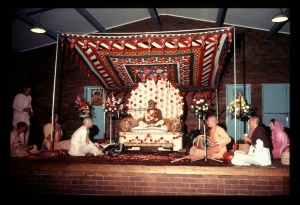CC Adi 16.11 (1975): Difference between revisions
(Vanibot #0027: CCMirror - Mirror CC's 1996 edition to form a basis for 1975) |
(Vanibot #0020: VersionCompareLinker - added a link to the Version Compare feature) |
||
| Line 2: | Line 2: | ||
<div style="float:left">'''[[Sri Caitanya-caritamrta (1975)|Śrī Caitanya-caritāmṛta (1975)]] - [[CC Adi (1975)|Ādi-līlā]] - [[CC Adi 16 (1975)|Chapter 16: The Pastimes of the Lord in His Childhood and Youth]]'''</div> | <div style="float:left">'''[[Sri Caitanya-caritamrta (1975)|Śrī Caitanya-caritāmṛta (1975)]] - [[CC Adi (1975)|Ādi-līlā]] - [[CC Adi 16 (1975)|Chapter 16: The Pastimes of the Lord in His Childhood and Youth]]'''</div> | ||
<div style="float:right">[[File:Go-previous.png|link=CC Adi 16.10 (1975)|Ādi-līlā 16.10]] '''[[CC Adi 16.10 (1975)|Ādi-līlā 16.10]] - [[CC Adi 16.12 (1975)|Ādi-līlā 16.12]]''' [[File:Go-next.png|link=CC Adi 16.12 (1975)|Ādi-līlā 16.12]]</div> | <div style="float:right">[[File:Go-previous.png|link=CC Adi 16.10 (1975)|Ādi-līlā 16.10]] '''[[CC Adi 16.10 (1975)|Ādi-līlā 16.10]] - [[CC Adi 16.12 (1975)|Ādi-līlā 16.12]]''' [[File:Go-next.png|link=CC Adi 16.12 (1975)|Ādi-līlā 16.12]]</div> | ||
{{CompareVersions|CC|Adi 16.11|CC 1975|CC 1996}} | |||
{{RandomImage}} | {{RandomImage}} | ||
==== TEXT 11 ==== | ==== TEXT 11 ==== | ||
| Line 32: | Line 31: | ||
<div class="purport"> | <div class="purport"> | ||
In Śrīmad-Bhāgavatam ([[SB 7.13.8]]) it is said, granthān naivābhyased bahūn na vyākhyām upayuñjīta: | In Śrīmad-Bhāgavatam ([[SB 7.13.8|7.13.8]]) it is said, granthān naivābhyased bahūn na vyākhyām upayuñjīta: "One should not read many books, nor should one try to make a profession of reciting many books, especially if one is a devotee." One must give up the ambition to be a learned scholar and in this way earn a worldly reputation and financial facilities. If one diverts his attention to studying many books, he cannot fix his mind in devotional service, nor can he understand many scriptures, for they are full of grave statements and meanings. In this connection Śrīla Bhaktisiddhānta Sarasvatī Ṭhākura gives his opinion that those who are attracted to studying many kinds of literature concerning various subject matters, especially fruitive activities and philosophical speculation, are deprived of unalloyed devotional service because of their splayed attention. | ||
Man has a general tendency toward fruitive activities, religious ritualistic ceremonies and philosophical speculation. A living entity thus bewildered since time immemorial does not understand the real goal of life, and thus his activities in life are wasted. Innocent persons misled in this way are deprived of unalloyed kṛṣṇa-bhakti, devotional service to the Lord. Tapana Miśra is a vivid example of such a person. He was a learned scholar, but he could not ascertain what the goal of life is. Therefore he was given a chance to hear Lord Caitanya Mahāprabhu instructing Sanātana Gosvāmī. Lord | Man has a general tendency toward fruitive activities, religious ritualistic ceremonies and philosophical speculation. A living entity thus bewildered since time immemorial does not understand the real goal of life, and thus his activities in life are wasted. Innocent persons misled in this way are deprived of unalloyed kṛṣṇa-bhakti, devotional service to the Lord. Tapana Miśra is a vivid example of such a person. He was a learned scholar, but he could not ascertain what the goal of life is. Therefore he was given a chance to hear Lord Caitanya Mahāprabhu instructing Sanātana Gosvāmī. Lord Caitanya's instruction to Tapana Miśra is especially significant for persons who loiter here and there collecting books and reading none of them, thus becoming bewildered regarding the aim of life. | ||
</div> | </div> | ||
Latest revision as of 15:39, 26 January 2020

A.C. Bhaktivedanta Swami Prabhupada
TEXT 11
- bahu-śāstre bahu-vākye citte bhrama haya
- sādhya-sādhana śreṣṭha nā haya niścaya
SYNONYMS
bahu-śāstre—by many books or scriptures; bahu-vākye—by many versions of many persons; citte—within the heart; bhrama—doubt; haya—there is; sādhya-sādhana—objective and means; śreṣṭha—about the best; nā—not; haya—there is; niścaya—certainty.
TRANSLATION
If one becomes a bookworm, reading many books and scriptures and hearing many commentaries and the instructions of many men, this will produce doubt within his heart. One cannot in this way ascertain the real goal of life.
PURPORT
In Śrīmad-Bhāgavatam (7.13.8) it is said, granthān naivābhyased bahūn na vyākhyām upayuñjīta: "One should not read many books, nor should one try to make a profession of reciting many books, especially if one is a devotee." One must give up the ambition to be a learned scholar and in this way earn a worldly reputation and financial facilities. If one diverts his attention to studying many books, he cannot fix his mind in devotional service, nor can he understand many scriptures, for they are full of grave statements and meanings. In this connection Śrīla Bhaktisiddhānta Sarasvatī Ṭhākura gives his opinion that those who are attracted to studying many kinds of literature concerning various subject matters, especially fruitive activities and philosophical speculation, are deprived of unalloyed devotional service because of their splayed attention.
Man has a general tendency toward fruitive activities, religious ritualistic ceremonies and philosophical speculation. A living entity thus bewildered since time immemorial does not understand the real goal of life, and thus his activities in life are wasted. Innocent persons misled in this way are deprived of unalloyed kṛṣṇa-bhakti, devotional service to the Lord. Tapana Miśra is a vivid example of such a person. He was a learned scholar, but he could not ascertain what the goal of life is. Therefore he was given a chance to hear Lord Caitanya Mahāprabhu instructing Sanātana Gosvāmī. Lord Caitanya's instruction to Tapana Miśra is especially significant for persons who loiter here and there collecting books and reading none of them, thus becoming bewildered regarding the aim of life.